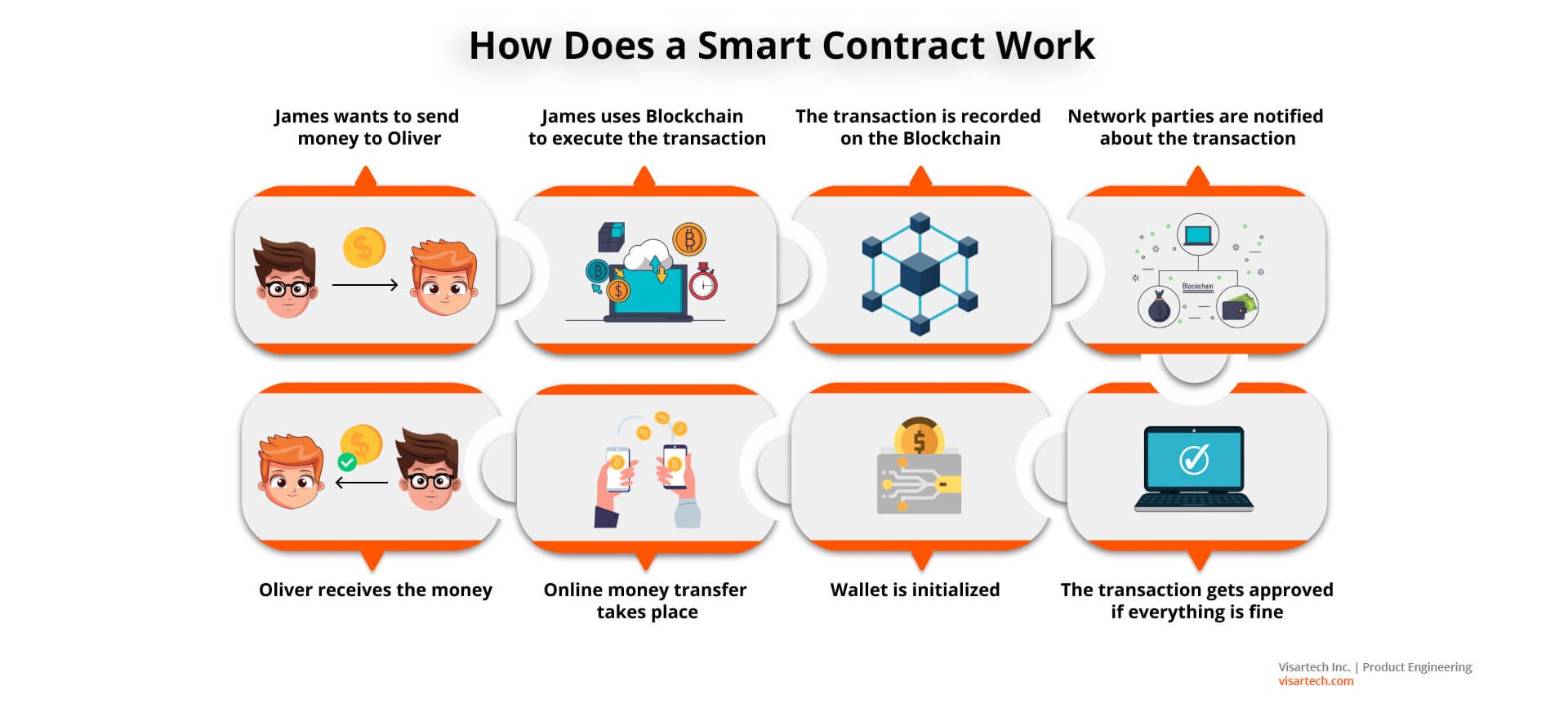Smart Contracts: What They Are and How They Work

- Understanding the Basics of Smart Contracts
- The Evolution of Contracts in the Digital Age
- Exploring the Benefits of Smart Contracts
- Key Components of Smart Contract Technology
- Real-World Applications of Smart Contracts
- Challenges and Limitations of Smart Contract Implementation
Understanding the Basics of Smart Contracts
Smart contracts are self-executing contracts with the terms of the agreement between buyer and seller directly written into lines of code. These contracts run on the blockchain, a decentralized and distributed ledger technology that ensures security and transparency.
One of the key features of smart contracts is their ability to automatically enforce the terms of the agreement without the need for intermediaries. This eliminates the risk of fraud and manipulation, as the code is immutable and cannot be altered once deployed.
Smart contracts can be used in a variety of industries, from finance and real estate to supply chain management and healthcare. They streamline processes, reduce costs, and increase efficiency by automating tasks that would traditionally require manual intervention.
By leveraging smart contracts, businesses can create trustless transactions, where parties can engage in agreements without relying on a central authority. This not only speeds up the process but also reduces the potential for disputes and delays.
Overall, understanding the basics of smart contracts is essential for anyone looking to explore the potential of blockchain technology. By grasping how these self-executing contracts work, individuals and organizations can unlock new opportunities for innovation and growth in the digital economy.
The Evolution of Contracts in the Digital Age
Contracts have been a fundamental part of human interaction for centuries, serving as a way to formalize agreements and ensure that all parties involved uphold their obligations. In the digital age, contracts have evolved to meet the needs of an increasingly interconnected and fast-paced world. Smart contracts, a type of self-executing contract with the terms of the agreement directly written into code, have emerged as a revolutionary way to streamline and automate contract processes.
Smart contracts are built on blockchain technology, which allows for secure and transparent transactions without the need for intermediaries. This technology ensures that contracts are tamper-proof and irreversible, providing a level of trust and efficiency that traditional contracts cannot match. As a result, smart contracts have the potential to revolutionize industries ranging from finance to real estate to supply chain management.
One of the key advantages of smart contracts is their ability to execute automatically once certain conditions are met. This eliminates the need for manual intervention and reduces the risk of errors or disputes. Additionally, smart contracts can be programmed to trigger actions based on real-time data, allowing for dynamic and adaptive agreements that can respond to changing circumstances.
As smart contracts continue to gain traction, it is important for businesses and individuals to understand how they work and how they can be integrated into existing processes. By leveraging the power of smart contracts, organizations can streamline operations, reduce costs, and improve security. The evolution of contracts in the digital age is paving the way for a more efficient and trustworthy way of doing business.
Exploring the Benefits of Smart Contracts
Smart contracts offer a wide range of benefits that make them an attractive option for various industries. One of the key advantages of smart contracts is their ability to automate and streamline processes, reducing the need for intermediaries and increasing efficiency. By eliminating the need for third parties, smart contracts can help reduce costs and minimize the risk of fraud.
Another benefit of smart contracts is their transparency and security. Because smart contracts are stored on a blockchain, they are immutable and tamper-proof, making them highly secure. This level of security can help build trust among parties involved in a contract, as they can be confident that the terms of the agreement will be executed as intended.
Smart contracts also offer increased speed and accuracy in contract execution. Traditional contracts often involve manual processes that can be time-consuming and prone to errors. Smart contracts, on the other hand, can execute automatically once the conditions are met, ensuring that the terms of the contract are fulfilled accurately and without delay.
Key Components of Smart Contract Technology
Smart contract technology consists of several key components that work together to enable the execution of self-executing contracts on blockchain networks. These components include:
– **Code**: Smart contracts are written in code, typically using programming languages like Solidity. The code outlines the terms and conditions of the contract, as well as the actions that should be taken when certain conditions are met.
– **Decentralized Network**: Smart contracts run on decentralized networks, such as Ethereum, that utilize blockchain technology. This ensures that the contract is executed in a secure and transparent manner, without the need for intermediaries.
– **Digital Signature**: Each party involved in a smart contract must provide a digital signature to authenticate their identity and consent to the terms of the contract. This helps to prevent fraud and ensure that all parties are bound by the agreement.
– **Blockchain**: Smart contracts are stored on a blockchain, which is a distributed ledger that records all transactions in a secure and immutable manner. This ensures that the contract’s execution is transparent and tamper-proof.
– **Oracle**: In some cases, smart contracts may need to interact with external data sources to execute certain conditions. Oracles are used to provide this external data to the smart contract, ensuring that it can operate effectively in the real world.
By leveraging these key components, smart contract technology enables the automation of contract execution, reducing the need for manual intervention and streamlining the process of conducting business transactions.
Real-World Applications of Smart Contracts
Smart contracts have a wide range of real-world applications across various industries. One of the most prominent uses of smart contracts is in the field of supply chain management. Companies can use smart contracts to automate and streamline the process of tracking and verifying the flow of goods and services throughout the supply chain. This can help reduce errors, fraud, and delays, ultimately leading to cost savings and increased efficiency.
Another important application of smart contracts is in the realm of real estate. By using smart contracts, buyers and sellers can automate the process of transferring property titles, verifying ownership, and executing transactions. This can help reduce the need for intermediaries such as lawyers and escrow agents, making the process faster, more secure, and less expensive.
Smart contracts are also being used in the insurance industry to automate claims processing and payouts. By encoding the terms of an insurance policy into a smart contract, insurers can automatically verify claims, calculate payouts, and transfer funds to policyholders in a timely manner. This can help reduce the administrative burden on insurance companies and improve the overall customer experience.
In the financial sector, smart contracts are being used to automate a wide range of processes, including loan origination, trading, and compliance. By using smart contracts, financial institutions can reduce the time and cost associated with these processes, while also improving transparency and security. Smart contracts can also help facilitate cross-border transactions by automating the process of verifying identities, complying with regulations, and transferring funds.
Overall, smart contracts have the potential to revolutionize the way business is conducted across a wide range of industries. By automating and streamlining processes, reducing the need for intermediaries, and improving transparency and security, smart contracts can help businesses operate more efficiently and effectively in the digital age.
Challenges and Limitations of Smart Contract Implementation
One of the main challenges in implementing smart contracts is the potential for bugs or vulnerabilities in the code. These bugs can lead to unexpected behavior or security breaches, which can have serious consequences for the parties involved. Additionally, smart contracts are only as secure as the underlying blockchain technology they are built on, so any weaknesses in the blockchain can also impact the smart contracts running on it.
Another limitation of smart contracts is their lack of flexibility. Once a smart contract is deployed on the blockchain, it is immutable and cannot be changed. This means that if there is a mistake in the code or if the terms of the contract need to be updated, it can be difficult or even impossible to make those changes. This lack of flexibility can be a significant drawback in situations where contract terms may need to be adjusted over time.
Additionally, smart contracts are only as smart as the people who create them. In order for a smart contract to function properly, it must be written correctly and include all necessary conditions and logic. If a smart contract is poorly written or if important details are overlooked, it can lead to errors or unintended consequences. This highlights the importance of having skilled developers who understand both the technical aspects of smart contracts and the specific requirements of the contract itself.
Furthermore, the legal status of smart contracts is still uncertain in many jurisdictions. While smart contracts are designed to be self-executing and enforceable, there may be legal challenges in proving the validity of a smart contract in a court of law. This lack of legal clarity can create uncertainty for parties entering into smart contracts and may limit the widespread adoption of this technology.
In conclusion, while smart contracts offer many benefits in terms of efficiency and security, there are also challenges and limitations that need to be considered. By addressing issues such as code vulnerabilities, lack of flexibility, the importance of skilled developers, and legal uncertainties, the potential of smart contracts can be maximized while minimizing risks.




